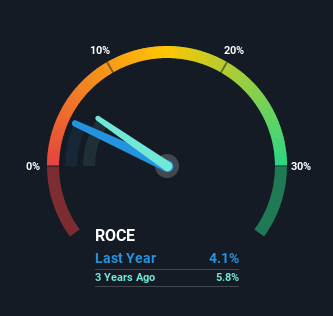- United States
- /
- Other Utilities
- /
- NasdaqGS:NWE
Return Trends At NorthWestern (NASDAQ:NWE) Aren't Appealing

What are the early trends we should look for to identify a stock that could multiply in value over the long term? Ideally, a business will show two trends; firstly a growing return on capital employed (ROCE) and secondly, an increasing amount of capital employed. If you see this, it typically means it's a company with a great business model and plenty of profitable reinvestment opportunities. However, after briefly looking over the numbers, we don't think NorthWestern (NASDAQ:NWE) has the makings of a multi-bagger going forward, but let's have a look at why that may be.
Return On Capital Employed (ROCE): What is it?
For those who don't know, ROCE is a measure of a company's yearly pre-tax profit (its return), relative to the capital employed in the business. To calculate this metric for NorthWestern, this is the formula:
Return on Capital Employed = Earnings Before Interest and Tax (EBIT) ÷ (Total Assets - Current Liabilities)
0.041 = US$257m ÷ (US$6.6b - US$348m) (Based on the trailing twelve months to June 2021).
Thus, NorthWestern has an ROCE of 4.1%. In absolute terms, that's a low return but it's around the Integrated Utilities industry average of 4.8%.
See our latest analysis for NorthWestern

In the above chart we have measured NorthWestern's prior ROCE against its prior performance, but the future is arguably more important. If you're interested, you can view the analysts predictions in our free report on analyst forecasts for the company.
How Are Returns Trending?
The returns on capital haven't changed much for NorthWestern in recent years. Over the past five years, ROCE has remained relatively flat at around 4.1% and the business has deployed 30% more capital into its operations. Given the company has increased the amount of capital employed, it appears the investments that have been made simply don't provide a high return on capital.
The Key Takeaway
As we've seen above, NorthWestern's returns on capital haven't increased but it is reinvesting in the business. And investors may be recognizing these trends since the stock has only returned a total of 26% to shareholders over the last five years. So if you're looking for a multi-bagger, the underlying trends indicate you may have better chances elsewhere.
NorthWestern does have some risks, we noticed 2 warning signs (and 1 which is significant) we think you should know about.
While NorthWestern may not currently earn the highest returns, we've compiled a list of companies that currently earn more than 25% return on equity. Check out this free list here.
If you’re looking to trade NorthWestern, open an account with the lowest-cost* platform trusted by professionals, Interactive Brokers. Their clients from over 200 countries and territories trade stocks, options, futures, forex, bonds and funds worldwide from a single integrated account. Promoted
If you're looking to trade NorthWestern Energy Group, open an account with the lowest-cost platform trusted by professionals, Interactive Brokers.
With clients in over 200 countries and territories, and access to 160 markets, IBKR lets you trade stocks, options, futures, forex, bonds and funds from a single integrated account.
Enjoy no hidden fees, no account minimums, and FX conversion rates as low as 0.03%, far better than what most brokers offer.
Sponsored ContentValuation is complex, but we're here to simplify it.
Discover if NorthWestern Energy Group might be undervalued or overvalued with our detailed analysis, featuring fair value estimates, potential risks, dividends, insider trades, and its financial condition.
Access Free AnalysisThis article by Simply Wall St is general in nature. It does not constitute a recommendation to buy or sell any stock, and does not take account of your objectives, or your financial situation. We aim to bring you long-term focused analysis driven by fundamental data. Note that our analysis may not factor in the latest price-sensitive company announcements or qualitative material. Simply Wall St has no position in any stocks mentioned.
*Interactive Brokers Rated Lowest Cost Broker by StockBrokers.com Annual Online Review 2020
Have feedback on this article? Concerned about the content? Get in touch with us directly. Alternatively, email editorial-team (at) simplywallst.com.
About NasdaqGS:NWE
NorthWestern Energy Group
Provides electricity and natural gas to residential, commercial, and various industrial customers.
Solid track record, good value and pays a dividend.
Similar Companies
Market Insights
Community Narratives



